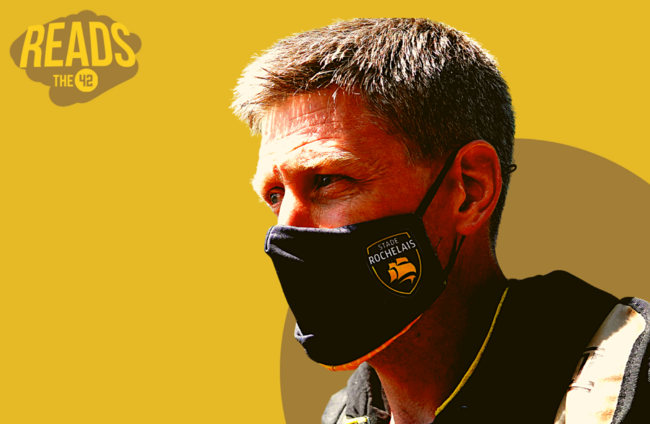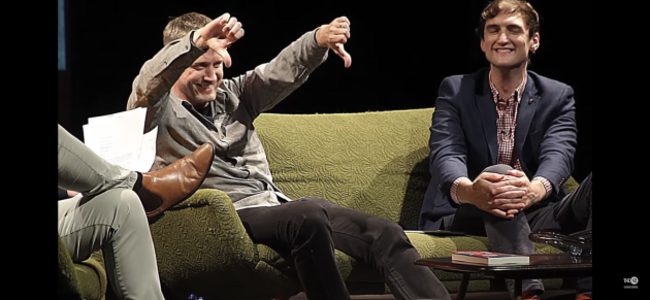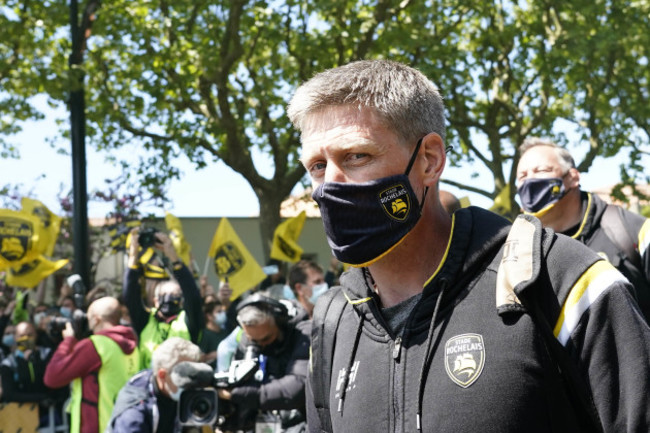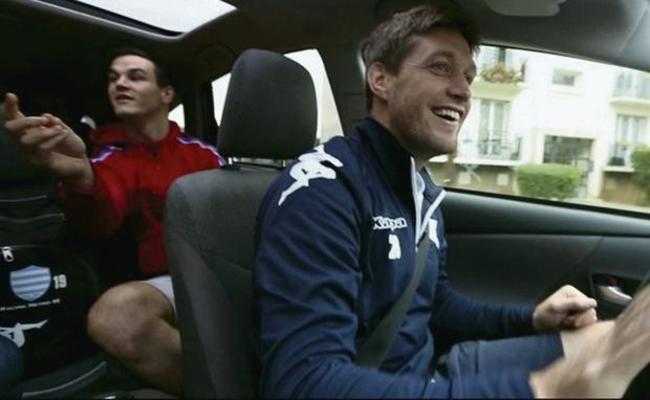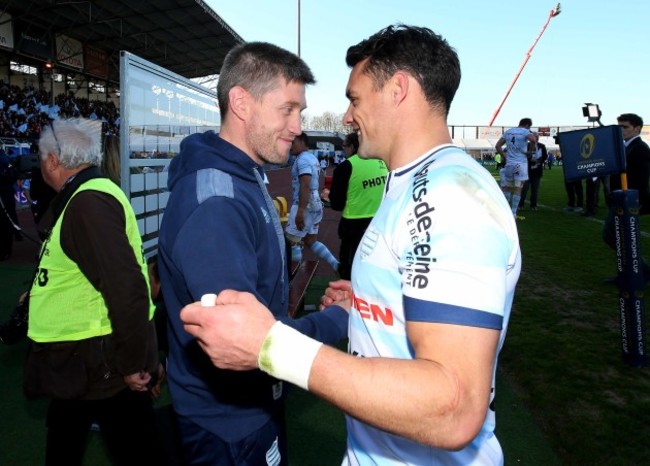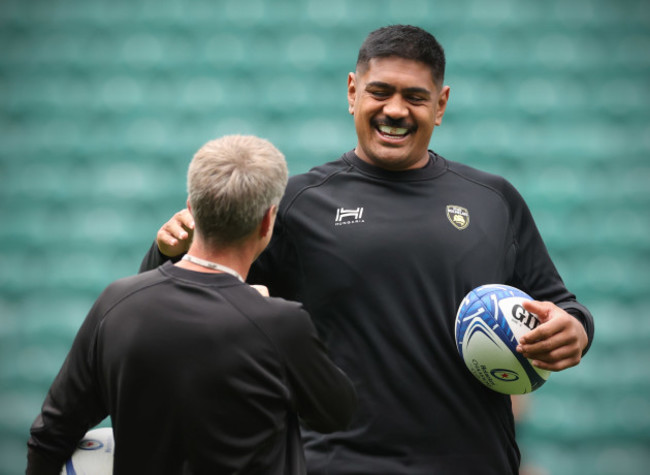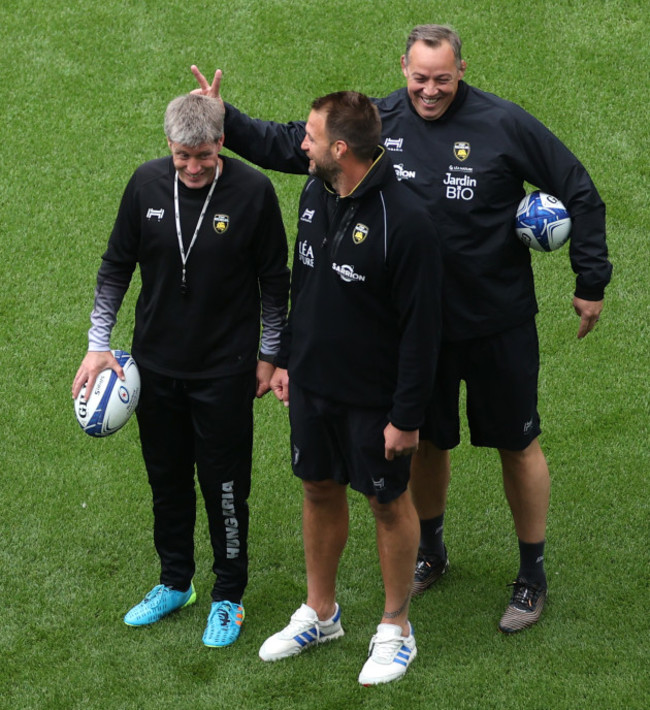IN NOVEMBER 2018, Murray Kinsella, myself and Ronan O’Gara — the latter then part of the coaching ticket at the Crusaders — were sitting onstage at Dublin’s Liberty Hall Theatre. We were doing a live event previewing Ireland’s upcoming Test match against New Zealand in Dublin.
Just before we rose from our seats at the half-time interval, O’Gara turned to Murray and asked quietly if he reckoned it’d be possible to turn up the lights over the audience, which was invisible to us from our spotlit vantage point. “It’d just be good to know how many people I’m talking to,” ROG said.
I mistook it for nervousness.
It turned out that the full lights were turned on anyway at the break, and so as many of the attendees streamed out to the bar and toilets and the three of us headed for our dressing room, O’Gara caught a glimpse of the 400 people who had paid for An Evening With ROG.
By the end of the second half of the show, the former Munster and Ireland out-half had those 400 people, plus the two journalists sitting beside him, on a string: asked if he could change one moment from his entire playing career, he said he would have booted Johnny Sexton up the arse when the Leinster out-half postured over him in the corner at Croke Park in 2009. During the Q&A climax, he turned Liberty Hall Theatre into the Ronan Colosseum, a thumbs-up or thumbs-down gesture from the evening’s emperor indicating whether or not he would acknowledge each question from the floor — his verdicts determined solely by whether or not the person asking the question firstly introduced themselves by name. When one patron at the back announced themselves as being from ‘CORK CITAAYYYY’ and tripped his way through a slightly protracted question, earning playful boos, ROG performatively ordered him a cab. For 10 or 15 minutes, he had the place in stitches.
- For more great storytelling and analysis from our award-winning journalists, join the club at The42 Membership today. Click here to find out more >
We were glad of the crescendo because, just beforehand, you could have heard a pin drop as O’Gara spent nigh on three minutes refusing to commit to a prediction for the Ireland-All Blacks Test. “The easy thing to do would be for me to just say Ireland, wouldn’t it?” he asked. “It really would,” I said. But he didn’t. He couldn’t.
He simply didn’t know who was going to win. And we watched him trying to figure it out, his gears turning as he rolled out parts of the game in piercing quiet. And just as they hung on his every word for the other hour and 40 minutes, in that moment, 400 people hung on his silence.
“He’s obviously very authentic,” Bernard Jackman said on this week’s The42 Rugby Weekly podcast when I asked him why O’Gara, unlike so many elite-level Irish rugby players and coaches, sees no need to bury his personality beneath a facade of banality.
“He is a very personable human being who likes to engage with people. That’s a big part of it.
“Also, I would say, his coaching has mainly taken place in France and, in fairness to France, you are allowed be yourself — they want you to express yourself. At all levels of French sport, for good or bad, you generally see coaches and managers not being afraid to express their own personality.
“It’s also more common in New Zealand: I’m lucky enough to be in a couple of coaching networks with coaches from New Zealand and, going back to Wayne Smith’s time, they’ve put a huge focus on being the best version of yourself, not trying to copy anyone else, and being comfortable in that.
It’s sad that it’s so regimented [in Ireland] and that people don’t give away anything. It’s players and coaches who tow the party line. They just become robots. It must be way more enjoyable to actually answer questions as you see them, try to engage with people, have a laugh when you can, be annoyed when you are annoyed, rather than just trying to tick boxes and go around in camouflage all the time.
“France are miles ahead of us in terms of engaging with sponsors, engaging with fans, the public,” added the former Grenbole head coach. “Every training session is open-policy; your club puts their schedule up for the week on the website so fans — the retired, the out of work, the kids — can come to training, and they meet the players before and afterwards. And journalists can come into the dressing room and do interviews, sponsors can come into the dressing room at half-time.
“Now, I’m not saying that’s all good, but they’re very focused on their need to survive commercially by engaging with people. And the La Rochelle project was based around bringing the community behind them. They have well over 200 sponsors, they sell out every week. You don’t just get that by being good on the pitch. You get that by being visible in the community.”
It’s an environment in which O’Gara thrives, evidenced by the fact that he will step up to the director-of-rugby role from next season in the absence of the Clermont-bound Jono Gibbes.
But by contrast, visibility in the community — and the pressure he felt to perform for his community — were things with which he struggled greatly during his playing days.
After arriving home from Ireland’s disastrous 2007 Rugby World Cup, O’Gara per his own admission spent “four days hiding in Cork” lamenting “the negative impact it had on people.”
I remember hearing him say towards the end of his playing career, “People probably see me as being difficult or grumpy or awkward when I’m away from the pitch.” It drew a wry smile as I thought back to chance encounters with O’Gara when my friends and I were growing up in Cork. These were far from ‘never-meet-your-heroes’ instances but they taught us that, sometimes, our heroes just want to pop into Xtra-vision in Douglas in peace.
“I wish I could have a laugh, I wish I could be smiling all the time, I wish I could enjoy it more”, O’Gara later said in his 2014 documentary, “but I didn’t.
“I spent days shitting myself in the lead-up to games. You question everything, you leave the room, you go for walks, you can’t sleep, you’re puking…”
Jackman describes O’Gara as “just a really good-natured, kind person” who loves “to look after people.” I was briefly exposed to that reality in adulthood when, during the worldwide shutdown of sport early in the pandemic, The42 found itself in a slog for survival and my work hours, as well as those of many colleagues, were significantly reduced.
As I realistically feared for my job, O’Gara was one of the first people to message me asking if he could do anything to help. It was a friendly gesture — but not one made by one friend to another; I wouldn’t pretend to know him at all.
“Chest out, broad shoulders,” he told me nonetheless. I hope he doesn’t mind my divulging that much but I certainly have no problem admitting that, while it’s been a long time since I’ve had sporting heroes, O’Gara made a fully grown man feel a few feet taller that day.
Back in his Munster and Ireland heyday, he might not have been so supportive of a borderline-stranger journalist. After all, not only was the media a large cog in the ever-spinning wheel of societal pressure that prevented O’Gara from actually enjoying the bulk of his legendary playing career, but there were times — particularly around the 2007 World Cup on the back of baseless allegations of gambling debts printed in the national press of France, who were incidentally Ireland’s pool opponents — when it encroached on his personal life to a sickening degree.
It’s surely no coincidence, then, that the twilight years he actually enjoyed as a player coincided with a decision to almost embrace media attention — or, at least, attempt to harness it.
“Now, at that point in time, around 2010, he was starting to talk about maybe retiring the following season, so we thought we’d be only following him for a year,” says Nathan Nugent who, along with Dave Berry, co-directed the 2014 documentary ROG, which aired on RTÉ. “And then he just kept putting retirement off because there was that battle between him and Johnny Sexton for the Ireland number-10 jersey. And for as long as that was still going on, he wasn’t going to give up the fight.
“For us, there was also his long-term relationship with Declan Kidney and how that had changed, and how Ronan felt a little let down by him; he wasn’t fully trusting of the reasons why he wasn’t getting picked and, ultimately, he had a belief that he could do a better job [than Sexton].
“We ended up spending three years with him and, what was really amazing was we started the documentary at a point when Johnny Sexton was really his nemesis: ‘The guy wants to take my jersey.’ And we finished it where he’s coaching him at Racing, picking him up for training. It was brilliant was just how accepting he was of each moment that required him to have to park his ego.
“The thing is”, Nugent continues, “over the few years, as much time as we spent with him, I would never dare say I ever ‘knew’ him. Do you know what I mean? Because I felt like we were spending time with someone who was going through such a tumultuous period in their career, where they were a leader on one hand but, on the other, they were forced to guard against their own insecurity. I look back on that moment in time and think he must have learned a lot about himself; to be a leading light for Munster and for Ireland for so long, and then to be the first one of that generation — the O’Connells, the O’Driscolls, the D’Arcys — to have to take a seat on the bench.
“He had a young family and he was staring into an uncertain future. I think he was going through a transitional period in his life in which he had to discover a huge amount about himself, who he was.
Funnily enough, I think by the time the documentary went out, it liberated him in that he had shown a side of him that people hadn’t seen before and he was able to re-engage with journalists and TV, and even do punditry, where people were fascinated by a more open version of him than they had seen before. I’m not saying it was because of the documentary; I’m just saying people’s reactions to that side of him were probably useful in resetting the relationship.
“My interest in him had been piqued long before he even finished playing,” says Tony Leen, sports editor of the Irish Examiner whose pages have, since 2013, played host to O’Gara’s famed column with which Leen assists.
“He just had that X factor where you knew he was thinking differently, he never resorted to cliché, he was just willing to go a different road, you know? The sheep mentality is awful. So much of the stuff we listen to now is homogonised; it’s so safe, it’s so practiced, it’s so middle-of-the-road. ROG never was any of those things.
“I touched base with him during his last season as a player, 2012/13,” Leen continues.
And I’ll always remember something he said to me — and it was one of those most obvious things that anyone could ever say until you actually hear them say it, and then you think about it; he said he places huge importance on trust and loyalty and he goes, ‘Why do you think I never left Munster for my entire career?’ There was a sense that The Examiner was that same comfortable fit for him: ‘I’m a Cork man, it’s my paper, let’s chat when I’m done.’
“His very first column was the blockbuster column where he announced that he was joining Racing as a coach, and that he was going to be coaching Johnny Sexton.
“In fairness to him, we were talking on a Friday and he confirmed it, but he had already started the column himself on the Wednesday. And I said to him, ‘Listen to me, that’s our cover story for tomorrow. That’s it, like. Is there any chance that when you’re signing the contract, that you’d get a picture taken on the mobile phone and you’d send it to me?’”
O’Gara met with Racing owner Jacky Lorenzetti at one of the billionaire’s wine exhibitions in London on that same Friday. At about four o’clock that afternoon, Leen’s WhatsApp pinged with a photo of O’Gara putting pen to paper with Lorenzetti in a wine cellar.
“He delivered bigtime,” laughs Leen. “Now, the only thing is, and it’s too often a problem, but L’Équipe caught wind of it at about six o’clock that evening so the news went up on Twitter, which was a pisser, obviously! But at the same time, we were the only ones with the full story — the column and the cover story in the following morning’s paper.”
Explaining fully the process of actually composing the column would take up three quarters of this very article, Leen warns. It differs literally from week to week. Most commonly, though, O’Gara handwrites the genesis of his piece on two or three yellow foolscap pages on a Tuesday night and WhatsApps a photograph of each of them to Leen. The pair then consult back and forth, with O’Gara detracting from and adding to a draft as they go — ‘I want to say a bit more about that, I think we can improve how I say that’ — until deadline on Thursday.
“The drive and the ideas come from him some weeks”, Leen explains, “and some weeks I might say, ‘You know what? We should do something on this.’ But when I do that, I’ll probably text him on a Monday. Because I pretty much know how his week works: office Monday, heavy training day Tuesday, office half-day Wednesday, heavy training day Thursday, travelling Friday if they’re away…
“There’s no set routine for the column. It’s not that it’s ghosted on the one hand, but it’s not that 1500 words arrive into my inbox on a Thursday on the other hand. It’s a collaborative effort.”
Leen admits that his and ROG’s working relationship is “at a place where you’re a little bit conflicted between being ‘the sports editor’ and being a friend”, as is only natural when you speak with somebody three days a week for eight years. “There have been times with the column where I’d say to him, ‘You know what, now, I think the way that you said that comes across wrongly, it could be misinterpreted.’
“I’ll give you an example: in this week’s column, he said that some of the La Rochelle lads are still afraid of Toulouse in their heads”, Leen says, paraphrasing O’Gara’s allusion to Toulouse’s formidable recent record of seven wins in eight against his side.
And I just text him back and said, ‘Are you sure you want to say that?’ And he was pretty much like, ‘Yeah, I mean, sure, that’s part of the issue we need to get over and there’s no point in trying to hide it, like. It’s out there and we need to confront it.’
Asked if he believes O’Gara uses the column as means of sending messages to his players, Leen won’t go as far as to speak for the author but adds:
What I can tell you as an absolute, hundred-per cent statement of fact — because of I’ve seen it and I’ve heard it and he’s said it so many times: that column, he says, was read in Christchurch every day, it was read in Paris, and it’s read in La Rochelle. Don’t worry: he knows the value and the power — and the danger — of the printed word. There have been a couple of occasions over the years where what’s gone in print has been changed for the online version because he’s thought twice about it: ‘No, I didn’t say that right.’
“He’s acutely aware that every word is parsed and analysed and dissected.”
Including by his former documentarian.
“I’m as fascinated by him today as I was back then, to be honest with you,” says Nugent.
“He’s such a smart person and I think with media work, he likes the kind of intellectual wrestle of why something works or doesn’t work, and to drill into it and go, ‘Oh, yeah, I get it now. I see why.’
Back when we were doing the documentary, we’d often talk about the role of an out-half and why certain matches went in certain directions. He was often quite philosophical about these things. Sometimes, he’d just land on the point that, ‘Look, if the pack in front of me are being dominated and I’m on the backfoot, I don’t have the second — the literal second of time — to make the best decision. And then there’d be other times when he’d start wondering why the mental energy of a game went one way or the other. Usually, it’d be directly after a match when you’d get these really insightful moments from him.
“But the rhythm of a sportsperson’s season is often dependent on being able to park the despair or elation after a game, and I thought he was able to that in a really fascinating way. He would often look back at himself in time and he wasn’t afraid to laugh at himself — laugh at what he thought, or how he felt, about certain things.
“What was true of him back then and is true of him now is that he’s someone with an inner belief of what he can do, but that’s counter-balanced by a genuine curiosity in the things that he doesn’t know about.”
Nugent and ROG co-director Berry were as surprised as anyone else when the Racing gig came to fruition towards the end of filming, travelling over to Paris for a day to shoot an O’Gara who was “quiet, aware of his role at Racing in the grand scheme of things.” From that point onwards in his rise through rugby’s coaching ranks, Nugent believes O’Gara was “either well advised or he just intuitively realised, ‘Look, there are gaps in my knowledge and these are the steps I want to take.’
“Part of me wondered would he happily remain a behind-the-scenes sort of coach, maybe a kicking coach or a backs coach,” he adds. “But where he has gotten to is a testament to the fact that players clearly gravitate towards someone who has an inner belief on the one hand but, on the other, is happy to admit that they don’t know everything, that they’re still learning, and that they’re still open to growth.
“He’s gone the opposite direction to most coaches who put up a front.”
Whether O’Gara’s refreshing rawness as a columnist and pundit could survive if he was to take a coaching job back in this direction remains to be seen.
People of a similar status in the game have mentioned to Leen their amazement that the La Rochelle head coach is still writing for a national newspaper even now. “I think he’s still comfortable enough doing it because it’s his column,” Leen says. “He will say as much or as little as he wants to say. He will write it in a way that he can live with. It’s not like he’s doing a weekly interview where he doesn’t have control over the rest of the words. He retains full, 100% control over his own mind and his own column.
“But look, at some stage, there’s going to come a time when he’s going to have to pull back”, Leen accepts, “and if it ever does come to pass, it’s probably going to be if he ends up coaching Ireland or coaching Munster.
“We’ve had eight fantastic years of value as a paper; we can see how popular it is, how well read it is. I’m also noticing more and more that it’s the coaching fraternity from whom you get reaction now, whereas it used to be only the newspaper-reading, rugby-supporting fraternity.
“It’s gold dust. And you say to yourself, ‘Well, how much longer can it last?’
“If you were asking me, I think we’ll have it for another two or three years — hopefully.
I don’t think the end of ROG’s time in La Rochelle, and by extension the end of his column with The Examiner, is coming any time in the immediate future. That’s what I’d say.
O’Gara’s ascent to director of rugby at La Rochelle, and his family’s grá for the area as was laid plain with the assistance of his wife, Jess, in this week’s column, would appear to echo Leen’s hunch.
“The incredibly exciting thing about Saturday”, O’Gara wrote in The Examiner ahead of today’s continental showpiece with Toulouse, “is that while the journey so far has been brilliant — and nobody needs convincing any more that we are on the right road — when you’ve won a trophy you don’t have to explain, you don’t even have to talk.”
Maybe a third European Cup medal, his first as a head coach, will afford him that luxury of a few weeks’ relative silence.
But we’ll hang on every word for as long as he’s giving them away.
- For more great storytelling and analysis from our award-winning journalists, join the club at The42 Membership today. Click here to find out more >
